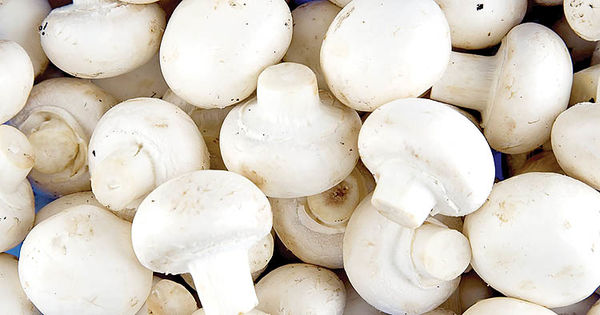Mushrooms are a rich source of antioxidants: Mushrooms are a rich source of antioxidants. In addition to reducing tissue damage caused by aging, antioxidants also support the immune system and reduce the negative effects of free radicals. This increases the risk of many diseases, such as heart disease and cancer.

A rich source of B vitamins: Mushrooms contain B vitamins that help maintain heart health, including vitamin B2, known as riboflavin, that helps renew red blood cells in the body, as well as vitamin B3, known as niacin, that helps maintain digestive health and skin health. In addition, mushrooms contain vitamin B5, called pantothenic acid, that helps the body produce hormones. Furthermore, it is important for the nervous system.
Mushrooms are the only plant source that naturally contains high levels of vitamin D. When exposed to the sun’s ultraviolet rays, mushrooms produce vitamin D2, while humans and animals produce vitamin D3.
Vitamin D3 is better than vitamin D2 in increasing vitamin D levels in the blood, but mushrooms contain almost 2,300 units of vitamin D2 per 100 grams, which is almost 30 times more. Despite the fact that some commercial mushrooms are grown in the dark, they have a very low percentage of vitamin D2, even though some farmers expose them to ultraviolet rays to achieve this. There will be an increase in the percentage. 100 grams of vitamin D2 contain 130 to 450 units.
In addition to dietary fibers, mushrooms also contain minerals such as phosphorus, zinc, and potassium, which help regulate blood pressure. Mushrooms also contain protein.
Mushroom properties and types
As mentioned earlier, mushrooms differ in their composition and nutrients, and here are some of the most popular types:
Shiitake mushrooms are usually found in Asian cuisine, and they are rich in copper, as well as zinc and manganese. Some types of B vitamins are naturally enriched with vitamin D.
The cordyceps mushroom is used for its health benefits. There are about 400 species of Cordyceps worldwide, most of which originate from the Kingdom of Bhutan in China, and are considered to be rich sources of antioxidants and anti-inflammatory properties.
A reishi mushroom has a red cap that looks like a kidney, and it has finger-like spores on the bottom. Besides containing dietary fiber, minerals, vitamins and amino acids, it contains compounds that have many health benefits, such as polysaccharides, peptides and triterpenoids.
A milk mane mushroom is a white mushroom with long and hairy thorns that is used as a food supplement by eating or consuming it. Among the substances found in these mushrooms are antioxidants and beta-glucan fiber, which support the health of the body.
Mushrooms with a soft cap and a small stem are known as white mushrooms. For vegetarians, it is a good source of protein, vitamin D, and vitamin B12.
Black mushroom is a type of wild edible mushroom. It is sometimes referred to as tree ear mushroom or cloud ear mushroom because of its shape. Black mushroom is low in fat and calories, but it is a rich source of dietary fiber. It contains small amounts of minerals and vitamins such as potassium, calcium, phosphorus, folate, and magnesium in every 7 grams. Maintaining heart, brain, and bone health.
Mushroom dangers
Some mushrooms are safe and edible, but others can cause poisoning and even death, so it is not recommended to consume them.
Health problems associated with mushroom consumption include the following:
Although mushrooms rarely cause allergies, some people may have an allergic reaction to them if they are allergic to molds.
Symptoms of poisoning in the gastrointestinal tract: some wild mushrooms may cause poisoning due to the compounds and toxic substances, causing nausea, diarrhea, vomiting, and spasms in the gastrointestinal tract, and these symptoms may disappear on their own or require hospitalization.
Poisoning in other organs: Some types of mushrooms contain neurotoxins that affect the kidneys, liver, or cause cancer, and some hallucinogenic mushrooms contain psilocybin, a compound that causes hallucinations. It should be noted that some mushroom toxins, which have no antidote and cause death within a few hours, affect the psyche and cognition.
Mushroom FAQs
Can you tell me about the benefits of canned mushrooms?
Although there is no information about the benefits of canned mushrooms and whether they differ from those of fresh mushrooms, canned mushrooms are usually higher in calories than fresh mushrooms, and salt and sodium in mushrooms should be reduced. Select canned foods that contain low sodium levels, since high sodium consumption may increase the risk of high blood pressure.
For pregnant women, what are the benefits of mushrooms?
For the health and development of the fetus, pregnant women need folate or folic acid in particular. Mushrooms contain a good amount of folate. Raw mushrooms contain 16.3 micrograms of folic acid per cup, while adults should consume 400 micrograms of folate daily.


